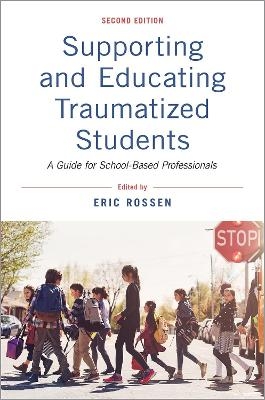
Supporting and Educating Traumatized Students
Oxford University Press Inc (Verlag)
978-0-19-005273-7 (ISBN)
Traumatic or adverse experiences are pervasive among school-aged children and youth. Trauma undermines students' ability to learn, form relationships, and manage their feelings and behavior. School-based professionals working with traumatized students are often unaware of their complex needs or how to meet them within the hours of the typical school day.
The second edition of Supporting and Educating Traumatized Students is a comprehensive guide for understanding and assisting students with a history of trauma. Designed specifically for professionals in mental health and education settings, this volume combines content and expertise from practitioners, researchers, and other experts with backgrounds in education, school psychology, school social work, school administration, resilience, school policy, and trauma. The book provides a thorough background on current research in trauma and its impact on school functioning; administrative and policy considerations; and a broad set of practical and implementable strategies and resources for adapting and differentiating instruction, modifying the classroom and school environments, and building competency for students and staff. New chapters address topics such as post-traumatic growth, interpersonal violence, and trauma screening and assessment among others. Educators can continue to use this updated edition as a reference and ongoing resource, with the ability to quickly and easily access a variety of school-based strategies to help improve educational and social outcomes for traumatized students.
Eric Rossen, PhD, NCSP, is a Nationally Certified School Psychologist, the director of professional development and standards for the National Association of School Psychologists (NASP), a licensed psychologist in Maryland, and a credentialed National Register Health Service psychologist. He has worked in public schools and in independent practice and has served as a college instructor and adjunct faculty at the University of Missouri and Prince George's Community College.
SECTION 1: Introduction to Trauma and Its Impact on School Functioning
Chapter 1: The Evolution of Trauma Informed Schools
Kathryn Simon, Sidonia Compton, and Stacy Overstreet
Chapter 2: How the Traumatic Experiences of Students Manifest in School Settings
Ron Hertel and Mona M. Johnson
Chapter 3: A Trauma-Informed Culturally-Responsive (TICR) Approach in the Classroom
Isaiah Pickens
Chapter 4: Instructional Strategies for a Trauma Informed Classroom
Hannah M. Grossman
Chapter 5: Understanding Posttraumatic Adjustment Trajectories in School-Age Youth: Supporting Stress Resistance, Resilient Recovery, and Growth
Christopher M. Layne and Stevan Hobfoll
SECTION 2: Potential Sources of Trauma and Implications for Classroom Instruction and School-Based Interventions
Chapter 6: Immigrant Students
Lyn Morland and Dina Birman
Chapter 7: Students Experiencing Homelessness
Diana Bowman and Patricia A. Popp
Chapter 8: Students Exposed to Community Violence
Dorothy Rohde-Collins
Chapter 9: Research and Best Practices to Support Students with Incarcerated Parents
Megan Sullivan
Chapter 10: Students with Parents Involved in Substance Abuse or Dependence
Celeste M. Malone, Tierra T. Ellis, and DeLon Isom
Chapter 11: Students Exposed to Domestic Violence
Lisa Weed Phifer
Chapter 12: Supporting Grieving Students
David Schonfeld and Thomas Demaria
Chapter 13: Students from Military Families
Mark C. Pisano
Chapter 14: Students Affected by Child Maltreatment
Delphine Collin-Vézina
Chapter 15: Students affected by interpersonal violence
Viann N. Nguyen-Feng, Tim Carroll, and Lindsey King
Chapter 16: Supporting Students Following Crises and Natural Disasters
Benjamin S. Fernandez
SECTION 3: Administrative and Policy Considerations
Chapter 17: Addressing Secondary Traumatic Stress in Trauma Informed Schools
Brenda Sweeney and James Caringi
Chapter 18: Trauma screening and assessment
Katie Eklund, Taylor Koriakin, Sandy Chafouleas, and Sophia Dodge
Chapter 19: Design as the Missing Variable in Trauma-Informed Schools
Dak Kopec and J. Davis Harte
Chapter 20: Developing School Staff Buy-In for Trauma-Informed Schools
Courtney N. Baker, Julia M. Augenstern, Stephanie A. Moberg, Nyx Robey, and Megan C. Saybe
Chapter 21: Effective Implementation and Evaluation of Trauma-Informed Schools
Elizabeth Cook and Pamela Black
| Erscheinungsdatum | 21.02.2020 |
|---|---|
| Verlagsort | New York |
| Sprache | englisch |
| Maße | 239 x 155 mm |
| Gewicht | 612 g |
| Themenwelt | Geisteswissenschaften ► Psychologie ► Klinische Psychologie |
| Medizin / Pharmazie ► Medizinische Fachgebiete ► Psychiatrie / Psychotherapie | |
| Sozialwissenschaften ► Pädagogik ► Didaktik | |
| ISBN-10 | 0-19-005273-2 / 0190052732 |
| ISBN-13 | 978-0-19-005273-7 / 9780190052737 |
| Zustand | Neuware |
| Haben Sie eine Frage zum Produkt? |
aus dem Bereich


